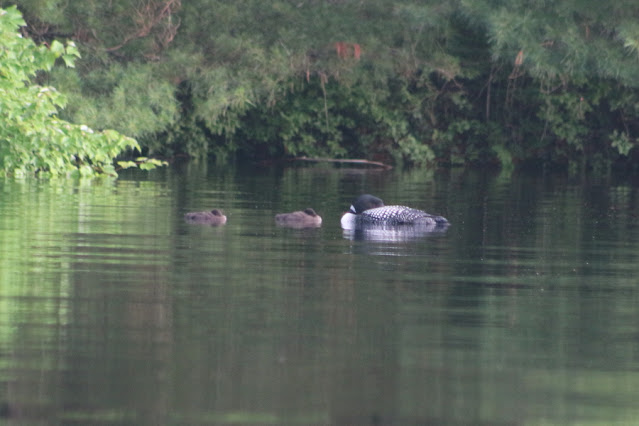I need to go back and catch up with some items that were neglected the past few weeks due to all the loon news on the lake. First, the appearance of Luna Moths occurred quite some time ago and several people told me of their sightings including this one by Dotty Treisner who found two of them resting on the red siding of her house.
 |
| Luna Moth (Actius Luna). Photo by Dotty Treisner. |
Though jealous of these sightings because I haven't seen one myself in many years I'm always excited to know these beautiful, huge moths are still present in the Lakes Region. A big reason they're not often seen is that they only live for about a week in their adult, moth form, during which time they mate but they don't eat - they don't even have a mouth or a digestive tract. All their food consumption occurs while they are a caterpillar, munching on tree leaves such as birch.
Another overdue observation dates all the way back to the rained-out bird walk that was to be led by UNH Extension Service biologist Mart Tarr at the Page Pond Community Forest. As we were all waiting at the trailhead to see if the thunderstorm would pass quickly (it didn't) he mentioned there had been a lot of Baltimore Orioles in new Hampshire this summer. Since I hadn't seen one of these bright orange birds yet this year I went out the next morning in the kayak to peruse likely oriole habitats, and sure enough I found one right away.
 |
| A Baltimore Oriole (Icterus galbula) sings from the highest branch of a white pine. |
They are such impressive birds and their loud, repeated song carries a long way over the water to lead you to them. You can listen to their songs here.
Another impressive bird is the great blue heron which even standing three feet tall is often hidden among the weeds and bushes of the shoreline. So it was an uncommon sight when Cindy Desmond saw one perched completely exposed on a raft.
 |
| A great blue heron (Ardea herodias) standing tall. Photo by Cindy Desmond. |
Wild creatures aren't ashamed to take advantage of human alterations to the environment when they suit their needs, sometimes to their benefit, sometimes to their demise. Running along the side of the road one day I saw a bright green snake sunning itself on the edge of road, soaking up the heat from the pavement. I stopped to encourage it to move farther from the road lest it become a participant of the old "Frogger" video game, but I was too late. Though still alive and wriggling from what looked like a minor injury I'm pretty sure it wasn't going to survive the trauma it had endured. And that wasn't the only snake-on-human-structure moment this week. One morning I found this large northern water snake sunning itself on our dock when I went out for a paddle.
 |
| One warm, happy, water snake. |
Like all snakes it wanted nothing to do with me and immediately slithered off the dock as I approached, but I was ready. You probably shouldn't watch this video if you don't like snakes and ever want to swim in a lake again.
There's been plenty of stormy weather lately including the most recent heavy rains from tropical storm Elsa; the lake right now is a good six inches above full pond. Did you catch the sunset as one of the recent storms departed?
I think our drought conditions have been largely remedied at this point.
I can't close without an update on the loons. Coco and Jimmy were both doing fine at my last check on Saturday. I don't see them as often now that they are widening their circle of travel all the way out to the area between Sheep and Bryant Islands. Keep an eye out for them on your lake trips as they may be most anywhere on the northern portion of the lake in the coming weeks - they are still pretty small and vulnerable.
My counterparts who report on the nature scene at Pleasant Lake in New London have been following an interesting loon story that mirrors our experience with a mate change. But the female loons battling each other on Pleasant Lake have not given up the fight and it's taking a toll on everyone. Their reporting implies that male loons fight over territory while female loons fight over males. This week's report is dramatic, violent, and heart wrenching, but it's worth reading to better understand these complex animals. You can find their report here; it will make you appreciate how fortunate we are to be having a peaceful year on Wicwas.
 |
| "Move your head dad, I can't see!" |
My counterparts who report on the nature scene at Pleasant Lake in New London have been following an interesting loon story that mirrors our experience with a mate change. But the female loons battling each other on Pleasant Lake have not given up the fight and it's taking a toll on everyone. Their reporting implies that male loons fight over territory while female loons fight over males. This week's report is dramatic, violent, and heart wrenching, but it's worth reading to better understand these complex animals. You can find their report here; it will make you appreciate how fortunate we are to be having a peaceful year on Wicwas.


No comments:
Post a Comment